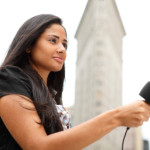Emerging from the bleakest times in journalistic history, what can magazine journalists do to future-proof their career? Beverley Whitehead crystallises an approach for the insightful storytellers of a new era.
The mix of digital journalism evokes an image of a rainbow cocktail. Stir together your knack for killer interviews, accurate research and compelling writing. Add a twist of innovation for how digital platforms (mobiles, blogs and online magazines) and multi-media blends (video, audio and images) can connect you to your readers. Shake it more creatively and collaboratively than ever before, and thrive!
Print magazine journalists already entertain, inform and inspire. The digital formula is the same, but at a faster pace, involving same-hour turnaround on stories and rapid responses from readers. It demands even more edgy storytelling and sharply-honed instincts for reaching audiences.
Here are six tips to guide your skills upgrade.
1. Choose the content you produce
In the debate about whether to “create” or “curate”, Bill Kellor, columnist at the New York Times magazine, in his article All the Aggregation That’s Fit to Aggregate, challenges the practice of word “piracy” and “packaging” typically associated with aggregated content sites such as The Huffington Post. He hopes that “serious” journalism – the original
John Relihan, CEO, Media24 Magazines, and a proponent of “curation”, differs. In an in-house article, A brave new world, Relihan insists that there’s great value in magazines curating content and thereby joining the dots for time-starved audiences.
Find your niche(s), think like a copywriter and use SEO tools to help you.
2. Collaborate in tech-savvy teams
Linda Gratton, Professor of Management Practice, London Business School and author of The Shift: the future of work is already here, advocates “serial mastery” as a future trend – to deepen your expertise in selected areas. If combining text, video, audio and images and distributing them across several digital platforms signify future milestones for you, collaborate with the data scientists and social media experts.
Goal: to reach your audience. Method: keep learning!
3. Get closer to your audience
Shelagh Goodwin, General Manager Human Resources, Media24, describes magazines as a “smaller part of a bigger community experience” which may extend to Facebook followers, live events or whatever invites your audience to participate. Get a head-start on what matters to people before they’ve expressed it! Pick a subject niche or three. Do so in digital form, in print and in person. Interact with your audience! Now who’s ahead of the game?
4. Craft your online presence
Be strategic about how you present yourself on social media platforms. Cape Town-based social media strategist, Rheta van Staden, separates LinkedIn for professional use and Facebook for fun. Connect with people you know and trust in your personal networks. Link your articles on your own blog. Hardwire weekly updates in your diary. Be active on Twitter. Readers follow people with shared interests. Participate: listen and be heard!
5. Be inspired by your competition
But express your own voice. Competing for readers’ attention (and disposable income) with the smorgasbord of digital alternatives, ranging from online interest groups and mobile apps to TED talks, is undoubtedly a challenge. Let your competition stimulate your ideas; but don’t underestimate the chemistry of a trusted local brand and a credible writer offering insightful commentary in a fresh print or digital package.
6. Think like an entrepreneur
Enterprising journalists would be wise to extend their expertise beyond knowing how to write stories that sell, to understanding (and shifting) the business model for selling content.
Sam Apple kicked off The Faster Times by offering early contributors 75% of the revenues from all advertisements placed
next to their articles. Consider how to translate your ideas and insights into tangible revenue streams.
[portfolio_slideshow]
About the author:

Beverley finds balance in yoga and reflection through writing. She is inspired by her family, friends, animals and the performing arts.
Image source: Yagan Kiely














